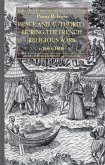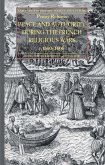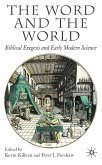This book is a cultural and intellectual history of anti-Catholicism in the period 1840-1870. The book will have two major themes: trans-nationalism and gender. Previous approaches to anti-Catholicism in the United States have adopted an exclusively national focus. This book breaks new ground by exploring the trans-Atlantic ties joining opponents of Catholicism in the United States and in France. The anticlerical works of major French writers such as Jules Michelet and Edgar Quinet flowed into the United States in the middle decades of the century. From the French perspective, the United States offered a model in combating the alleged ambitions of the Church. The literature and ideas which passed through this trans-Atlantic channel were overwhelmingly concerned with masculinity, femininity and domesticity. On both sides of the Atlantic, anti-Catholic literature was filled with images of priests or Jesuits craftily usurping the authority of fathers, of young girls tricked into entering convents and then subjected to merciless sexual and physical abuse, of families torn apart by the agents of the Church. Of course, the gender and domestic ideals underlying this opposition to Catholicism were not identical across the two societies. Nevertheless, gender and domesticity acted as a platform on which the trans-Atlantic case against Catholicism was built.
"Timothy Verhoeven s study of anti-Catholicism as a transatlantic phenomenon in the middle decades of the nineteenth century makes for lively and informative reading. In addition to fulfilling all the orthodox criteria of scholarly history (with immaculate documentation and scrutiny of its sources and thorough coverage of existing literature), it is a book whose intellectual scope and engaging composition are likely to make it appealing to several different audiences. It is a masterly contribution from a historian whose future work will be awaited with real interest." - American Historical Review
"Timothy Verhoeven s comparative study of religious invective illuminates important relationships between religion, gender, and national identities in both France and the United States. Transatlantic anti-Catholicism is deeply researched, well-written, and full of sharp and significant historical insight." - Thomas Kselman, Professor of History, University of Notre Dame
"Transatlantic Anti-Catholicism rescues American anti-Catholic nativism from the often parochial scholarly framework of its treatment in historiography. The author draws attention to little-known Franco-American intellectual connections in the nineteenth century and explores the role of family, manhood, and womanhood in explaining the virulence and content of anti-Catholic opinion. Thereby, Verhoeven makes an enlightening contribution to cultural and transnational history." - Ian Tyrrell, Scientia Professor of History, University of New South Wales, Australia
In the mid-nineteenth century, American and French opponents of the Catholic Church were joined by a swift traffic in ideas, books, and people. Trans-Atlantic Anti-Catholicism is the first major account of this vibrant transnational movement. From the great outcry over the fate of a Jewish boy forcibly removed from his parents, the story of a nun held captive in a cell for twenty-one years, and the ever-present fear of the Jesuit, Timothy Verhoeven uncovers the vast areas of exchange and alliance between the enemies of the Church in these two nations.
"Timothy Verhoeven s comparative study of religious invective illuminates important relationships between religion, gender, and national identities in both France and the United States. Transatlantic anti-Catholicism is deeply researched, well-written, and full of sharp and significant historical insight." - Thomas Kselman, Professor of History, University of Notre Dame
"Transatlantic Anti-Catholicism rescues American anti-Catholic nativism from the often parochial scholarly framework of its treatment in historiography. The author draws attention to little-known Franco-American intellectual connections in the nineteenth century and explores the role of family, manhood, and womanhood in explaining the virulence and content of anti-Catholic opinion. Thereby, Verhoeven makes an enlightening contribution to cultural and transnational history." - Ian Tyrrell, Scientia Professor of History, University of New South Wales, Australia
In the mid-nineteenth century, American and French opponents of the Catholic Church were joined by a swift traffic in ideas, books, and people. Trans-Atlantic Anti-Catholicism is the first major account of this vibrant transnational movement. From the great outcry over the fate of a Jewish boy forcibly removed from his parents, the story of a nun held captive in a cell for twenty-one years, and the ever-present fear of the Jesuit, Timothy Verhoeven uncovers the vast areas of exchange and alliance between the enemies of the Church in these two nations.








